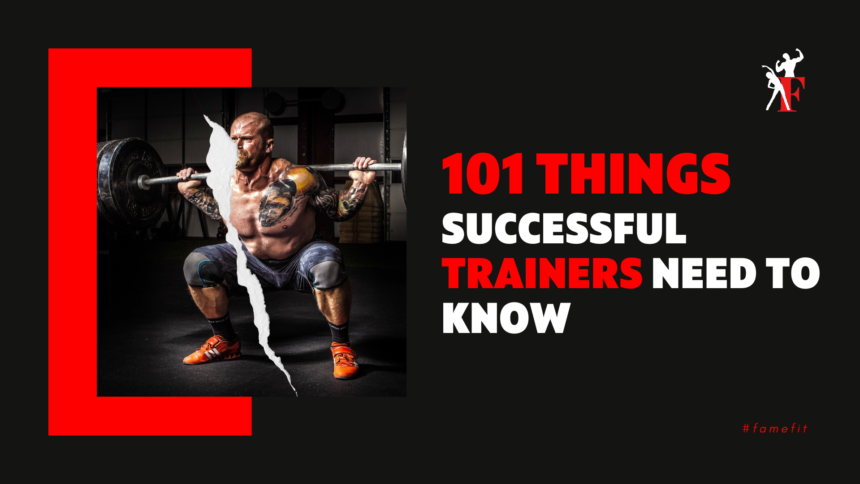The Big List of 101 Things Successful Trainers Need to Know
Want to be successful? Every smart fitness coach knows these 101 personal training secrets. Don’t skip #28 on this big list—it could get you fired!
Introduction
Personal training is a unique and rewarding career. While it may be easy to break into the field, there are 101 key insights that separate the most successful trainers from the rest. The team at FAME FIT has put together this ultimate guide of “must-knows” for personal trainers. Familiarize yourself with these principles to elevate your career and maximize client success.
Key Insights for Personal Trainers
1-10: Core Training Insights

- Workout Soreness: Being sore doesn’t indicate a good workout. Smashing clients isn’t the answer.
- Squats & Knees: Squats aren’t inherently bad for knees; technique matters.
- Detox Myths: Detoxes don’t cleanse the body—your liver does.
- Protein Limits: More protein doesn’t automatically mean more muscle growth.
- Diet Punishment: Don’t use harder workouts as punishment for poor eating choices.
- Efficient Warm-Ups: Mobility matters, but don’t waste time on excessive foam rolling.
- Tracking Not Always Needed: Calories and macros count, but clients don’t always need to track them.
- Movement Basics: Know JAM (Joints, Actions, Muscles) to understand exercises.
- Programming Variables: Master VFI (Volume, Frequency, Intensity) in program design.
- Energy Balance: Eating only “healthy” foods doesn’t guarantee weight loss or maintenance.
11-20: Relationship and Coaching Skills
- Empathy: If you don’t care for clients, this isn’t the career for you.
- Coaching vs. Training: Aim to guide, not just train clients.
- Exercise Priorities: Prioritize principles over excessive methods.
- Long-Term Focus: Focus on sustainable results.
- It Depends: Many answers in fitness vary by client.
- Client Loyalty: Prioritize the clients you have over those you don’t.
- Session Continuity: Coaching extends beyond sessions.
- Continuous Learning: Cert 3 and 4 are just the beginning.
- Specificity Principle: Tailor programs to individual goals.
- Use It or Lose It: Physical skills and gains require ongoing practice.
21-30: Core Training & Science Principles
- Volume Limits: Your clients don’t need excessive exercises per session.
- Progressive Overload: Overload is key for adaptations.
- Individual Differences: Each client has unique needs.
- Biomechanics Basics: Understand levers, torque, and movement mechanics.
- Client Uniqueness: Adapt techniques to each individual.
- Myth of Anabolic Window: Post-workout nutrition is flexible.
- Protein Powder: It’s not a shortcut for muscle gains.
- Punctuality: Being late can get you fired.
- Central Nervous System: Respect the CNS’s role in all training.
- Exercise Variety: There’s no one-size-fits-all exercise.
31-40: Safety, Communication, and Client Autonomy
- Safe Loading: Ensure safe movement before loading weight.
- Stimulate, Don’t Annihilate: Avoid extreme training.
- Metabolic Fire Myth: Meal frequency has minimal effect on metabolism.
- Client Screening: Essential for longevity and progress.
- Consistency: Adherence is crucial for results.
- Multiple Planes of Movement: Include variety in movement.
- Sweeteners: They aren’t inherently unhealthy in moderation.
- Professionalism: Treat personal training as a career.
- Clear Communication: Ensure clients understand instructions.
- Guided Decisions: Help clients make informed choices.
41-50: Progress Tracking and Psychology
- Avoid Stagnation: Introduce variation to avoid accommodation.
- Body Continuum: No bodily function is simply on or off.
- Refer When Necessary: Don’t hesitate to refer out.
- Scope of Practice: Respect professional boundaries.
- Meal Plan Limitations: Often do more harm than good.
- Problem-Solving Skills: Use knowledge to solve client issues.
- Teach, Don’t Hoard Knowledge: Educate clients for long-term success.
- Willingness to Change: You can’t change clients who aren’t ready.
- Measure to Manage: Tracking progress is essential.
- Client Honesty: Clients may not always be upfront, so learn to read between the lines.
51-60: Nutrition and Lifestyle
- Misreporting Habits: Be aware clients might misreport diet/exercise.
- Carbs for Recovery: Carbs at night can aid sleep and recovery.
- Experience Matters: Test out the workouts you design.
- Flexible Breakfast Timing: Adapt meals to client lifestyles.
- Principles Over Methods: Focus on fundamental principles.
- Avoid Jargon: Speak clearly and simply to clients.
- Effective Cueing: Tailor cues to client needs.
- Learning Styles: Cater teaching to visual, auditory, or kinesthetic preferences.
- Science-Driven: Use science to guide training.
- Finding Optimal Paths: Many ways to achieve goals—find the best path for each client.
61-70: Physical Training Specifics
- Glute Training: Incorporate glutes in all planes of movement.
- Deadlifts & Backs: Technique is key to preventing injury.
- Blending Science & Art: Develop a coaching style.
- Beyond Rep Counting: Training is about guiding journeys.
- Show Care: Care is essential, even if you aren’t “friends.”
- Fitness Fatigue Model: Understand athletic performance basics.
- Sustainable Changes: Focus on habit-building, not quick fixes.
- Comprehensive Coaching: Reflect, learn, and grow from mistakes.
- Integrity: Builds long-term client trust.
- Multiple Training Approaches: Tailor programs to individual needs.
71-80: Movement and Science-Based Training
- Mobility vs. Stability: Include both in training.
- Dunning-Kruger Effect: Recognize limitations as you learn more.
- Recovery vs. Overtraining: Under-recovery is often the issue.
- Training Frequency: Once a week per muscle isn’t always optimal.
- Exercise vs. Training: Know the difference.
- Avoid Trends: Fitness science is consistent over decades.
- SRA Principle: Stimulate, recover, adapt.
- Balancing Needs & Wants: Success lies between what clients want and need.
- Moderation is Key: Consistency is crucial.
- Simple Reinforcement: Reiterate key principles.
81-90: Credibility and Client Interactions
- Moderation Reminder: It’s worth repeating!
- Expert Claims: Self-proclaimed experts may lack depth.
- Focus on Clients: Avoid distractions during sessions.
- Follower Count ≠ Knowledge: Social media numbers don’t equate to expertise.
- Avoid Cookie-Cutter Programs: Customize training and diets.
- Core Focus: Core workouts shouldn’t dominate.
- Functional Training: Ensure exercises have a clear purpose.
- Celebrate Successes: Small wins build client motivation.
- Process-Oriented: Prioritize processes over short-term outcomes.
- No Magic Muscle Growth: Progressive overload is key.
91-101: Applied Knowledge and Wisdom
- Effective Exercises for Gen Pop: Focus on efficient movements.
- Pareto Principle: 80% of results come from 20% effort.
- Muscle Isolation Myths: Muscles don’t work in complete isolation.
- Recovery Variation: Different systems recover at different rates.
- Wide Grip Myths: Wide grips don’t necessarily widen backs.
- Range of Motion: Adapt exercises to client’s structure.
- Myth of Muscle Targeting: Exercises can’t isolate specific areas of a muscle.
- Plyometrics for Fat Loss: Plyo isn’t the solution for fat loss goals.
- Purposeful Exercises: Use exercises with clear benefits.
- Knowledge vs. Application: Applied knowledge is true power.
Conclusion
These 101 insights serve as a roadmap for successful personal trainers. Knowledge is only powerful when applied, so make sure to incorporate these principles into your practice for client success and professional growth. And if you’re a client—choose a trainer who knows these principles and is ready to apply them!









